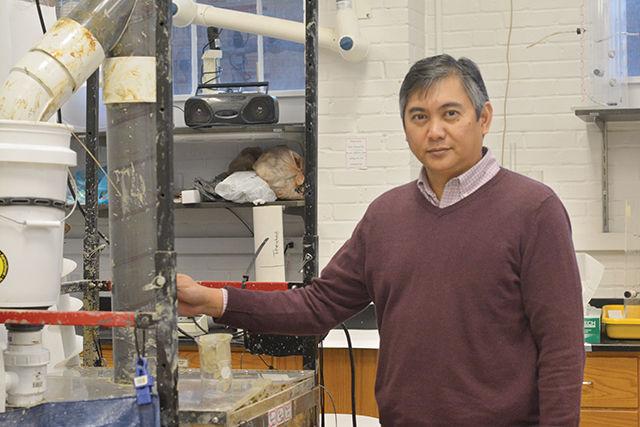 " />
" />
Sam Feldstein
Dr. Francis de los Reyes, civil engineering professor and sanitation activist, stands next to a test set-up of "The Excrevator," the screw augur used to empty pit latrines in the developing world in the Environmental Engineering laboratory in Broughton Hall. "The worldwide sanitation problem is complex and involves not just technological challenges but also considers cultural, social, political, and business/finance issues" de Los Reyes said.
When most people flush the toilet, they do not think or worry about what happens next. But for an engineering professor at NC State, the process is just beginning.
Francis de los Reyes is a professor of civil, construction and environmental engineering who teaches undergraduate and graduate level courses and works with modern sewage treatment. However, he is most known for his work and research on sanitation in developing countries, made famous by his TED talk on the subject.
“A lot of people in environmental engineering are looking at first world problems,” de los Reyes said. “The problems of developing countries are often more basic.”
Much of the developing world uses pit-latrines in the ground for defecation because there isn’t any modern infrastructure, according to de los Reyes. He said as many as 2.5 billion people lack access to basic sanitation needs.
His goal is to solve this problem, not with modern sewage and plumbing, which is not economically feasible for a developing nation, but with decentralized systems where bodily waste is disposed of, removed from the pit and then reused in an environmentally conscious manner.
“The key is to figure out the most sustainable option,” de los Reyes said. “By sustainable, we mean making sense economically, environmentally sound, protecting public health and also socially equitable.”
De los Reyes attributed some of his unique perspective in the environmental engineering field to his upbringing in the Philippines.
“Growing up in the Philippines, we were not poor, but you could see the effect of poverty all around you,” he said.
He said he began his undergraduate education at the University of the Philippines with a BS in agricultural engineering. He then came to the United States to complete his master’s at Iowa State and doctorate at the University of Illinois in environmental engineering.
“In the back of my mind, I always had the problems of the developing world,” he said.
With these problems in mind, de los Reyes came to NC State in 2000. Since arriving, he has worked with faculty and students alike to develop solutions for pit-latrine sanitation problems. Traditionally, the degrading and dangerous task of pit emptying by bucket is performed by individuals of low social status with no protective clothing.
As an undergraduate, Tate Rogers worked with de los Reyes and designed a low cost machine to remove pit waste.
Dubbed “The Excrevator,” the machine is an auger which sucks waste from the pit in a manner much more sanitary and less degrading for the operator.
“If they have a machine and a uniform, it is looked at as a professional business,” de los Reyes said. “The professionalism brings a level of dignity.”
The problem of sanitation in the third world is not just the social issue for the pit-emptiers, but also a multifold problem with environmental consequences, such as pit overflow into the water sources and other health concerns. This led to the Bill and Melinda Gates Foundation to call for a reinvention of the toilet.
De los Reyes’ and Roger’s project with “The Excrevator” received funding in 2011 and continues with monetary support from the foundation today. They have worked in India, South Africa and Malawi helping to develop and test this decentralized toilet system.
Using methods from his background in microbiology, de los Reyes takes samples from a pit to determine which microorganisms are present. By tracking the DNA of the microorganisms, it can be determined if a pathogen is in a pit-latrine.
“Nobody had mapped out the environment of a pit-latrine before,” he said.
With this information, it can be determined how to combat and eliminate these pathogens in the waste, according to de los Reyes.
He also said he intends to utilize methods of reusing the extracted waste as products like manure for farms. The addition of an economic side makes it feasible for operation of the machine with a source of revenue, turning a sanitation problem into a small business.
Students are eager to assist de los Reyes in his research. In his lab, he employs both graduate and undergraduate students.
“He gave me an opportunity, even though I did not have the same lab experience being an undergraduate, to help with my skill set,” said Risa Sayre, a junior studying environmental sciences.
Using his own background and skills as well as those of the NC State community, de los Reyes and his team have presented a possible solution to a global problem.
“I’ve been seeing over the past years, students at NC State and elsewhere have been really interested in going abroad and solving these problems in the developing world,” de los Reyes said.